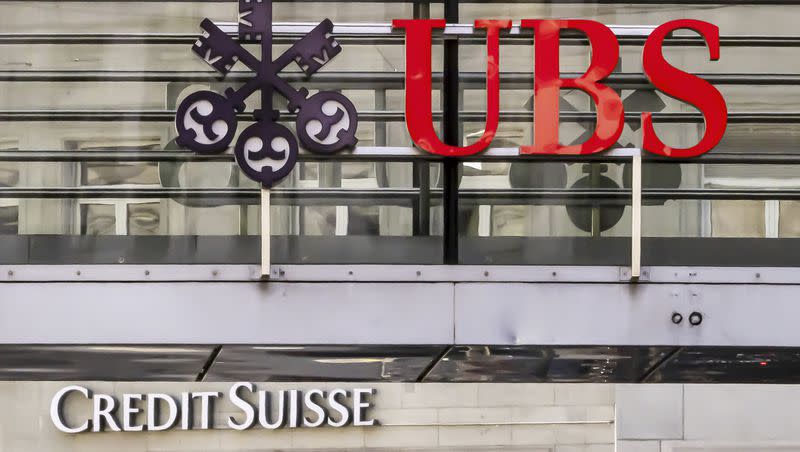UBS takeover of Credit Suisse drives some market calming, but Fed facing interest rate dilemma

The regulator-driven buyout of embattled Credit Suisse over the weekend by its larger Swiss bank competitor UBS helped seed some calming of global banking markets on Monday following last week’s tumult after the collapse of Silicon Valley and Signature banks.
And while still-hot U.S. inflation was expected to drive another big interest rate hike from the Federal Reserve this week, after the recent tumble in the financial sector, economists believe ongoing banking industry uncertainty will help temper that decision and a more moderate .25% hike from the Fed is widely expected.
Swiss regulators orchestrated the purchase of Credit Suisse by UBS in a bid to stop more turmoil after the two U.S. bank failures. In an indication of the frantic, behind-the-scenes deal-making to resolve the issue before markets opened, the acquisition was announced late Sunday, according to the Associated Press.
Related
Utah leaders respond to Silicon Valley Bank meltdown as feds promise to cover depositors
The seismic impact of Silicon Valley Bank’s failure is rocking Silicon Slopes companies in Utah
As banking worries persist, new data shows U.S. inflation eased to 6% last month
Swiss authorities urged UBS to take over its smaller rival after a central bank plan for Credit Suisse to borrow up to 50 billion francs ($54 billion) last week failed to reassure investors and customers, per AP.
Many of Credit Suisse’s problems were unique and unlike the weaknesses that brought down Silicon Valley Bank and Signature Bank in the U.S., including high interest rates, the Associated Press reported. Those U.S. failures have raised questions about other potentially weak global financial institutions, sweeping up the already beleaguered Swiss bank.
We announced our intention to acquire @CreditSuisse. This strengthens UBS' position as leading global wealth manager in highly attractive growth markets. We continue to focus on the needs of our clients, with the support of our new colleagues. Learn more https://t.co/p3LfwKbcfZ
— UBS (@UBS) March 20, 2023
The Dow Jones, Nasdaq and S&P 500 all closed the regular trading day up on Monday. Zions Bancorporation stock closed at $30.18 per share, up about .8% from where it ended regular trading last week.
The Federal Reserve board is set to meet this week and announce its decision on any adjustment to its overnight lending rate on Wednesday. The monetary body has executed a series of eight rate hikes over the past year, moving its benchmark rate from near zero to the current range of 4.5% to 4.75%.
The interest rate increases were one of the factors hurting Silicon Valley Bank, which earlier this month became the second-biggest U.S. bank failure in history, AP reported. Bonds owned by it and other banks have seen their prices fall as interest rates rose sharply.
Last week, the Department of Labor reported year-over-year inflation dropped to 6% in February, down from January’s 6.4% rate and the smallest annual price increase since September 2021. While price increases on goods and services showed easing on an annual basis, they still inched up .4% over January, according to the report.
The increasing cost of shelter was a primary driver behind the month-over-month increase, according to the department, while price hikes on food and recreation also contributed.
The Mountain West region, which includes Utah, continued to see the highest inflation rates in the country in February. Annual inflation came in at 6.7% for the region last month.
The inflation report came out just days after federal officials stepped in to cover depositors at two large banks, California-based Silicon Valley Bank and New York’s Signature Bank, after both institutions were closed following customer runs. Silicon Valley held $209 billion in assets when it was shuttered and Signature held $110 billion when New York regulators shut it down.
While both banks were outliers thanks to their very focused customer bases, the tech sector for Silicon Valley and cryptocurrency for Signature, the surprise closures have roiled the banking industry and sent stock prices for financial institutions plunging. The closures have also driven heightened scrutiny of regional banks and particularly the amount of uninsured deposits as percentage of overall assets. Both Silicon Valley and Signature banks had unusually high numbers of accounts with deposits in excess of the FDIC’s $250,000 insurance limit, mostly due to their business-focused structures.
“The market is trying to digest: Is this just a few bad financial companies that have really made some bad decisions, or is the whole thing a house of cards?” Ryan Detrick, chief market strategist at Carson Group, told the Associated Press on Monday. “We’re optimistic that it’s multiple banks in a bad situation but not the entire system.”

